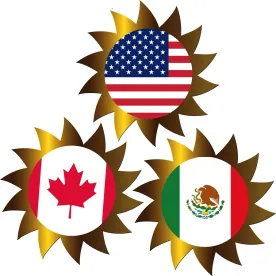On June 3, 2017, the Government of Canada (“GOC”) announced in the Canada Gazette that it will undertake an online, domestic consultation process regarding the North American Free Trade Agreement (NAFTA) with Canadian stakeholders, including territories and provinces, businesses, Canada’s Indigenous peoples, civil society organizations, not-for-profit organizations, labor unions, academics, and other interested Canadians. The announcement by Global Affairs Canada can be found here (“GOC Notice”).
This follows the notice issued by the United States Government (“USG”) on May 18, 2017 that indicated the USG’s intention to initiate negotiations with Canada and Mexico to “modernize” the NAFTA. This notice started a ninety (90) day notice period in the US in accordance with the Bipartisan Congressional Trade Priorities and Accountability Act of 2015 (“TPA 2015”). As a result, the formal negotiations between Canada, the US, and Mexico are scheduled to commence no sooner than August 16, 2017 with consultations to take place throughout June 2017. Written submissions are due to the USG by June 12, 2017, and the formal hearing to determine the specific proposed objectives will be held on June 27, 2017. Further information on this process can be found here.
Canada’s Consultations – Timeline, Scope, and Impact
According to the GOC, the solicitation of public comments will be used to “identify key interests and concerns with respect to [the modernization] of NAFTA,” and in particular, to seek information with respect to the areas that have been the most beneficial to Canadian exporters. The GOC Notice outlines the following topics which parallel the broad objectives included in the USG’s May 18, 2017 letter:
-
modifications to rules of origin or origin procedures for NAFTA qualifying foods;
-
customs and trade facilitation issues;
-
treatment of specific goods, including import and export interests or barriers and tariffs on articles;
-
trade remedies;
-
labor issues;
-
environmental issues;
-
investment issues;
-
intellectual property rights issues;
-
digital trade issues;
-
government procurement issues;
-
competition-related matters; and
-
other relevant barriers to trade between Canada, the U.S. and Mexico.
In addition, Canada’s invitation for public comments introduces the following topic areas not previously discussed in the USG’s formal notice:
-
energy and basic petrochemicals;
-
standards-related measures;
-
emergency action;
-
telecommunications;
-
financial services;
-
temporary entry for business persons;
-
publication, notification and administration of laws;
-
e-commerce; and
-
regulatory coherence.
Written submissions by interested parties are due to Global Affairs Canada (“GAC”) by July 18, 2017. Interested parties are also welcome to participate in consultation events, the details of which are to be confirmed. Notably, the July 18, 2017, submission deadline to the GAC is expected to roughly coincide with the issuance of the United States Trade Representative’s (“USTR”) “30-day notice” of more detailed negotiation objectives made pursuant to TPA 2015 and the formal negotiations deadline of August 16, 2017. This appears to be a deliberate effort on Canada’s behalf to align the Canadian NAFTA renegotiation schedule with that of the United States.
One of the reasons for this alignment may be that the Canadian consultation process is likely to unfold in tandem with that of the United States. The United States Secretary of Commerce, Wilbur Ross, has described the USTR’s 30-day notice expected in July 2017 as a “way-station.” However, given criticism by the United States Congress of the vague nature of the May 18, 2017 letter, Congress may use this July letter more as “an obstacle on the track” that may “derail” NAFTA timelines. If the United States Congress disapproves of the objectives set forth in the USTR’s July notice, the USTR will have to rework the stated objectives thereby extending the NAFTA timelines.
Next Steps
As written submissions will be used to inform Canada’s negotiation strategy and areas of focus in this fast-paced renegotiation, Canadian companies with an interest in the NAFTA renegotiation would be well advised to communicate their key interests and concerns to Global Affairs Canada, the Government of Canada, and other affected stakeholders. Dickinson Wright is well-positioned to assist interested participants in both Canada and the US in making their views known before relevant administrative agencies on both sides of the border.
Dylan E. Augruso contributed to this post.




 />i
/>i

